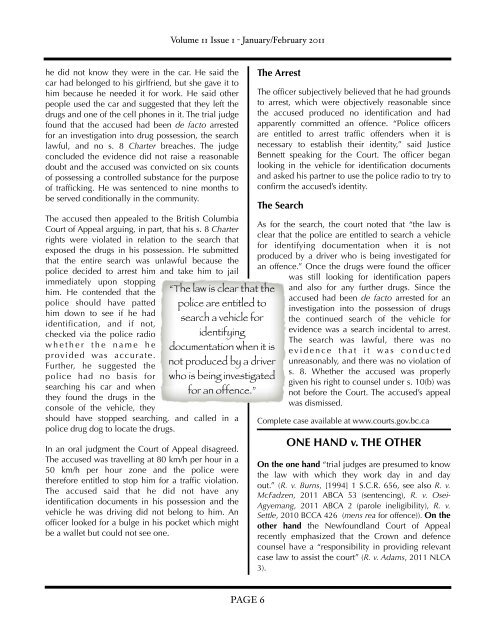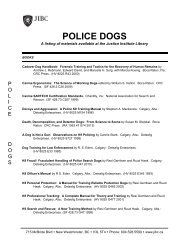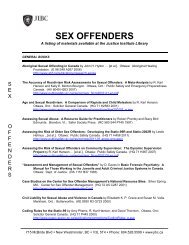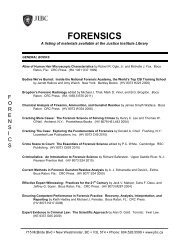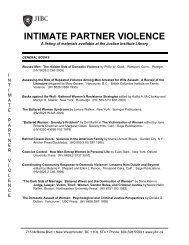legally speaking - Justice Institute of British Columbia
legally speaking - Justice Institute of British Columbia
legally speaking - Justice Institute of British Columbia
You also want an ePaper? Increase the reach of your titles
YUMPU automatically turns print PDFs into web optimized ePapers that Google loves.
he did not know they were in the car. He said the<br />
car had belonged to his girlfriend, but she gave it to<br />
him because he needed it for work. He said other<br />
people used the car and suggested that they left the<br />
drugs and one <strong>of</strong> the cell phones in it. The trial judge<br />
found that the accused had been de facto arrested<br />
for an investigation into drug possession, the search<br />
lawful, and no s. 8 Charter breaches. The judge<br />
concluded the evidence did not raise a reasonable<br />
doubt and the accused was convicted on six counts<br />
<strong>of</strong> possessing a controlled substance for the purpose<br />
<strong>of</strong> trafficking. He was sentenced to nine months to<br />
be served conditionally in the community.<br />
Volume 11 Issue 1 - January/February 2011<br />
The accused then appealed to the <strong>British</strong> <strong>Columbia</strong><br />
Court <strong>of</strong> Appeal arguing, in part, that his s. 8 Charter<br />
rights were violated in relation to the search that<br />
exposed the drugs in his possession. He submitted<br />
that the entire search was unlawful because the<br />
police decided to arrest him and take him to jail<br />
immediately upon stopping<br />
him. He contended that the “The law is clear that the<br />
police should have patted police are entitled to<br />
him down to see if he had<br />
search a vehicle for<br />
identification, and if not,<br />
checked via the police radio identifying<br />
w h e t h e r t h e n a m e h e documentation when it is<br />
provided was accurate.<br />
Further, he suggested the<br />
not produced by a driver<br />
police had no basis for who is being investigated<br />
searching his car and when<br />
for an <strong>of</strong>fence.”<br />
they found the drugs in the<br />
console <strong>of</strong> the vehicle, they<br />
should have stopped searching, and called in a<br />
police drug dog to locate the drugs.<br />
In an oral judgment the Court <strong>of</strong> Appeal disagreed.<br />
The accused was travelling at 80 km/h per hour in a<br />
50 km/h per hour zone and the police were<br />
therefore entitled to stop him for a traffic violation.<br />
The accused said that he did not have any<br />
identification documents in his possession and the<br />
vehicle he was driving did not belong to him. An<br />
<strong>of</strong>ficer looked for a bulge in his pocket which might<br />
be a wallet but could not see one.<br />
PAGE 6<br />
The Arrest<br />
The <strong>of</strong>ficer subjectively believed that he had grounds<br />
to arrest, which were objectively reasonable since<br />
the accused produced no identification and had<br />
apparently committed an <strong>of</strong>fence. “Police <strong>of</strong>ficers<br />
are entitled to arrest traffic <strong>of</strong>fenders when it is<br />
necessary to establish their identity,” said <strong>Justice</strong><br />
Bennett <strong>speaking</strong> for the Court. The <strong>of</strong>ficer began<br />
looking in the vehicle for identification documents<br />
and asked his partner to use the police radio to try to<br />
confirm the accused’s identity.<br />
The Search<br />
As for the search, the court noted that “the law is<br />
clear that the police are entitled to search a vehicle<br />
for identifying documentation when it is not<br />
produced by a driver who is being investigated for<br />
an <strong>of</strong>fence.” Once the drugs were found the <strong>of</strong>ficer<br />
was still looking for identification papers<br />
and also for any further drugs. Since the<br />
accused had been de facto arrested for an<br />
investigation into the possession <strong>of</strong> drugs<br />
the continued search <strong>of</strong> the vehicle for<br />
evidence was a search incidental to arrest.<br />
The search was lawful, there was no<br />
e v i d e n c e t h a t i t w a s c o n d u c t e d<br />
unreasonably, and there was no violation <strong>of</strong><br />
s. 8. Whether the accused was properly<br />
given his right to counsel under s. 10(b) was<br />
not before the Court. The accused’s appeal<br />
was dismissed.<br />
Complete case available at www.courts.gov.bc.ca<br />
ONE HAND v. THE OTHER<br />
On the one hand “trial judges are presumed to know<br />
the law with which they work day in and day<br />
out.” (R. v. Burns, [1994] 1 S.C.R. 656, see also R. v.<br />
McFadzen, 2011 ABCA 53 (sentencing), R. v. Osei-<br />
Agyemang, 2011 ABCA 2 (parole ineligibility), R. v.<br />
Settle, 2010 BCCA 426 (mens rea for <strong>of</strong>fence)). On the<br />
other hand the Newfoundland Court <strong>of</strong> Appeal<br />
recently emphasized that the Crown and defence<br />
counsel have a “responsibility in providing relevant<br />
case law to assist the court” (R. v. Adams, 2011 NLCA<br />
3).


